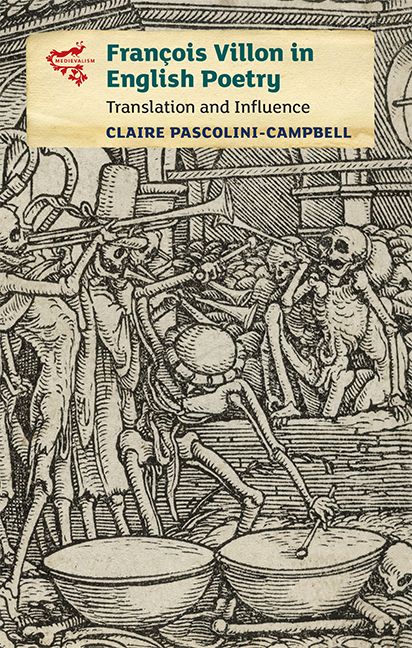Book contents
- Frontmatter
- Contents
- A Note on the Poets and the Poems
- Acknowledgements
- Introduction
- 1 Then and Now: The Legend of Villon in the Middle Ages and in Modernity
- 2 Villon and Swinburne: Finding and Singing Villon
- 3 Villon and Rossetti: Poetics of Strangeness
- 4 Villon and Pound: Modernity and the ‘Mediaeval Dream’
- 5 Villon and Bunting: Prison-Writing and Parody
- 6 Villon and Lowell: Imitation and the Visible Translator
- Conclusion
- Appendices
- Bibliography
- Index
- Medievalism
Conclusion
Published online by Cambridge University Press: 09 October 2019
- Frontmatter
- Contents
- A Note on the Poets and the Poems
- Acknowledgements
- Introduction
- 1 Then and Now: The Legend of Villon in the Middle Ages and in Modernity
- 2 Villon and Swinburne: Finding and Singing Villon
- 3 Villon and Rossetti: Poetics of Strangeness
- 4 Villon and Pound: Modernity and the ‘Mediaeval Dream’
- 5 Villon and Bunting: Prison-Writing and Parody
- 6 Villon and Lowell: Imitation and the Visible Translator
- Conclusion
- Appendices
- Bibliography
- Index
- Medievalism
Summary
Peu de Villons en bon savoir
Trops de Villons pour decevoir
(Clément Marot, Les OEuvres de Francoys Villon)
WRITING IN THE SIXTEENTH century, Marot was troubled by the instability of Villon's text, the fact that popular enthusiasm for his work had led to a proliferation of copies being made, many of them apparently poor in quality. How were audiences to avoid being taken in by these inaccurate versions of Villon's oeuvre and the flawed representations of the poet that they created? His answer was to attempt to codify Villon's text, providing the first version of his poetry ‘en bon savoir’ that can be considered to be an edition. Translation, on the other hand, although still plagued by the issue of fidelity, has no such qualms about the existence of multiple versions of the same text; it is understood as an essentially generative mode. While, for Marot, there was a crying need to stabilise Villon's unruly text, for Villon's translators, his oeuvre can forever beget new poems.
This is not, of course, to say that Villon's translators have not needed to negotiate the presence of alternative versions: indeed, all of the poet-translators who feature in this book have, to greater or lesser extents, both acknowledged and navigated the presence of their precursors in translation. Thus, while Swinburne, Rossetti, Pound, Bunting, and Lowell have partly been selected to provide a historical understanding of the use of Villon as a source poet for translation into English, taking us from the earliest translations of the poet in the first half of the nineteenth century to postmodern adaptations of his work in the second half of the twentieth, that is only one side of the story. Indeed, they are also intended to demonstrate that an accumulation of intertextual influences is at play in any single version of Villon, and that the tradition of Villon in English poetry is determined as much by the relationships between the poet-translators and the literary movements to which they belong as by individual interpretations of the STs. While the presence of the medieval French poet in English poetry is extensive, the TTs considered in this book suggest that there are a number of trends in the nature of his influence, and they can therefore be used to exemplify a wider tradition of rendering Villon into English.
- Type
- Chapter
- Information
- François Villon in English PoetryTranslation and Influence, pp. 163 - 182Publisher: Boydell & BrewerPrint publication year: 2018

